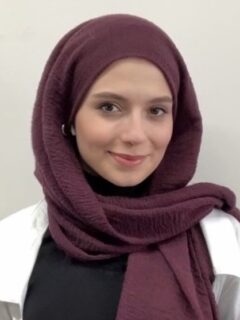Emine Karakaya
Development, chemical functionalization and characterisation of bioinks for biofabrication
Betreuer: Dr. Rainer Detsch, Prof. Dr.-Ing. habil. Aldo R. Boccaccini
Biofabrication is a promising approach expanding the boundaries of tissue engineering and regenerative medicine [1][2]. In biofabrication, cells are 3D printed within a bioink being therefore subjected to mechanical stresses during the 3D printing process [3]. This project (TP: B06) belongs to the DFG funded SFB/Transregio TRR 225 („From the fundamentals of biofabrication towards functional tissue models“). The main objective is the investigation of the effects of physical and chemical conditions (e.g. shear forces) during 3D printing on cell behaviour in well defined bioinks, for example based on alginate and its modifications [4]. For this purpose, reporter cells are used to investigate diverse parameters of the 3D bioplotting process to optimize the composition of the bioink in order to improve the properties of the final cell laden construct.
[1] Pereira R F, Barrias C C, Granja P L, Bartolo P J et al. (2013) Advanced biofabrication strategies for skin regeneration and repair. Nanomedicine (Lond) 8(4): 603-21.
[2] Moroni L, Burdick J A, Yoo J J et al. (2018) Biofabrication strategies for 3D in vitro models and regerative medicine. Nature Reviews Materials 3: 21-37.
[3] Hölzl K, Lin S, Tytgat L, Van Vlierberghe S, Gu L, Ovsianikov A et al. (2016) Bioink properties before, during and after 3D bioprinting. Biofabrication 8(3): 032002.
[4] Reakasame, S. et al. (2018) Oxidized Alginate-Based Hydrogels for Tissue Engineering Applications: A Review; Biomacromolecules 19; 3-21.

